Books
Books
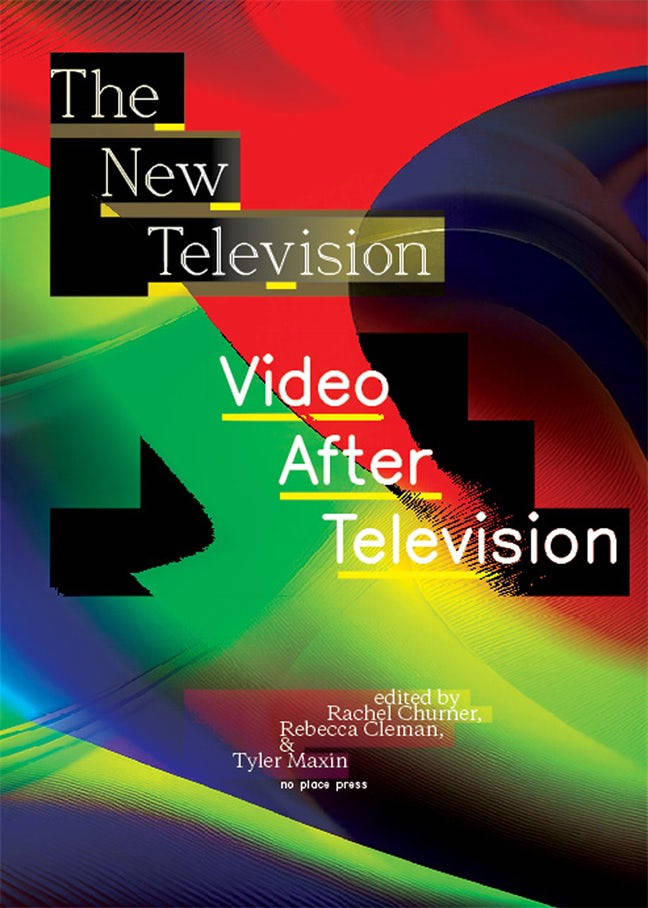
The New Television: Video After Television
Rachel Churner, Rebecca Cleman and 1 more
On the rich history of video art and its enduring relevance to today's artistic and critical practices.
The New Television delves into the rich history of video art, reexamining the pivotal Open Circuits conference held at MoMA in 1974 and exploring its enduring relevance to today's artistic and critical practices. Open Circuits was an important event in establishing video art in American museums and articulated a range of conflicting teloses for the medium, some which materialized (like local cable television) and others that remain unrealized. The conference proceedings were published in 1977 as The New Television: A Public/Private Art, and the radical design of the book reflected the conference's utopian aims.
This two-part publication includes a facsimile of the long-out-of-print conference proceedings and new essays and discussions by over a dozen scholars and artists. The new scholarly texts and previously unpublished archival documents in The New Television illuminate the network of institutional histories of video art, consider global televisual contexts and alternative critical approaches, and examine contemporary video art and its continued relevance from new perspectives.
Rachel Churner is the director of the Carolee Schneemann Foundation. She is also an art critic and editor, whose writings have appeared in Artforum and October magazine, among other publications. She was a recipient of the 2018 Creative Capital/Andy Warhol Foundation Arts Writers Grant and is the editor of multiple books, including Jacqueline Humphries: jHΩ1:) (2022); Yvonne Rainer: Revisions (no place press, 2020), Hans Haacke (MIT Press, 2015), and two volumes of writings by film historian Annette Michelson (MIT Press, 2017 and 2020). Churner is a faculty member at Eugene Lang College at The New School, New York.
Rebecca Cleman is Executive Director of Electronic Arts Intermix (EAI) and a writer. She has programmed screenings and special projects for such venues as the International House Philadelphia; the Museum of Art and Design, Anthology Film Archives, and Andrea Rosen Gallery, New York City; and the Julia Stoschek Collection, Germany; and organized or co-organized many events for EAI, including a panel discussion on the films of David Wojnarowicz and a conversation between Hilton Als and The Wooster Group's director and co-founder Elizabeth LeCompte.
Tyler Maxin is curator at Blank Forms. He was previously the Communications and Special Projects Associate at Electronic Arts Intermix (EAI). His writing has appeared in publications including Artforum, BOMB, and Film Comment.

Thing
Robert Ford, Trent Adkins and 1 more
Started in 1989 by designer and writer Robert Ford, THING magazine was the voice of the Queer Black music and art scene in the early 1990s. Ford and his editors were part of the burgeoning House music scene, which originated in Chicago’s Queer underground, and some of the top DJs and musicians from that time were featured in the magazine, including Frankie Knuckles, Gemini, Larry Heard, Rupaul, and Deee-Lite. THING published ten issues from 1989-1993, before it was cut short by Ford’s death from AIDS-related illness. All ten issues of THING are collected and published here for the first time.
As House music thrived, THING captured the multidisciplinary nature of the scene, opening its pages to a wide range of subjects: poetry and gossip, fiction and art, interviews and polemics. The HIV/AIDS crisis loomed large in its contents, particularly in the personal reflections and vital treatment resources that it published. An essay by poet Essex Hemphill was published alongside the gossip columnist Michael Musto and Rupaul dished wisdom alongside a diary from the March on Washington for Lesbian, Gay, and Bi Equal Rights and Liberation. Joan Jett Blakk’s revolutionary presidential campaign is contained in these pages, as are some of the most underground, influential literary voices of the time, such as Dennis Cooper, Vaginal Davis, Gary Indiana, Marlon Riggs, David Wojnarowicz, and even David Sedaris.
THING was very much in dialogue with the club kids in New York and other Queer publishing ventures, but in many ways, it fostered an entirely unique perspective—one with more serious ambitions. In a moment when the gay community was besieged by the HIV/AIDS crisis and a wantonly cruel government, the influence and significance of this cheaply-produced newsprint magazine vastly exceeded its humble means, presenting a beautiful portrait of the ball and club culture that existed in Chicago with deep intellectual reflections. THING was a publication by and for its community and understood the fleetingness of its moment. To reencounter this work today, is to reinstate the Black voices who were so central to the history of HIV/AIDS activism and Queer and club culture, but which were often sidelined by white Queer discourse. In many ways, THING offered a blueprint for the fundamental role a magazine plays in bringing together a community, its tagline summing up the bold stakes of this important venture: “She Knows Who She Is.”
The magazine included contributions from Trent D. Adkins, Joey Arias, Aaron Avant Garde, Ed Bailey, Freddie Bain, Basscut, Belasco, Joan Jett Blakk, Simone Bouyer, Lady Bunny, Bunny & Pussy, Derrick Carter, Fire Chick, Chicklet, Stephanie Coleman, Bill Coleman, Lee Collins, Gregory Conerly, Mark Contratto, Dennis Cooper, Dorian Corey, Ed Crosby, The Darva, Vaginal Davis, Deee-Lite, Tor Dettwiler, Riley Evans, Evil, The Fabulous Pop Tarts, Mark Farina, Larry Flick, Robert Ford, Scott Free, David Gandy, Gemini, Gabriel Gomez, Roy Gonsalves, Chuck Gonzales, Tony Greene, André Halmon, Lyle Ashton Harris, Larry Heard, Essex Hemphill, Kathryn Hixson, Sterling Houston, Ishmael Houston-Jones, Gary Indiana, Candy J, Jamoo, Jazzmun, Gant Johnson, Owen Keehnen, Lady Miss Kier, Spencer Kincy, Iris Kit, Erin Krystle, Steve LaFreniere, Larvetta Larvon, Marc Loveless, Lypsinka, Malone, Marjorie Marginal, Terry A. Martin, Rodney McCoy Jr., Alan Miller, Bobby Miller, Michael Musto, Ultra Naté, Willi Ninja, Scott “Spunk” O’Hara, DeAundra Peek, Earl Pleasure, Marlon Riggs, Robert Rodi, Todd Roulette, RuPaul, Chantay Savage, David Sedaris, Rosser Shymanski, Larry Tee, Voice Farm, Lawrence D. Warren, Martha Wash, LeRoy Whitfield, Stephen Winter, David Wojnarowicz, and Hector Xtravaganza.
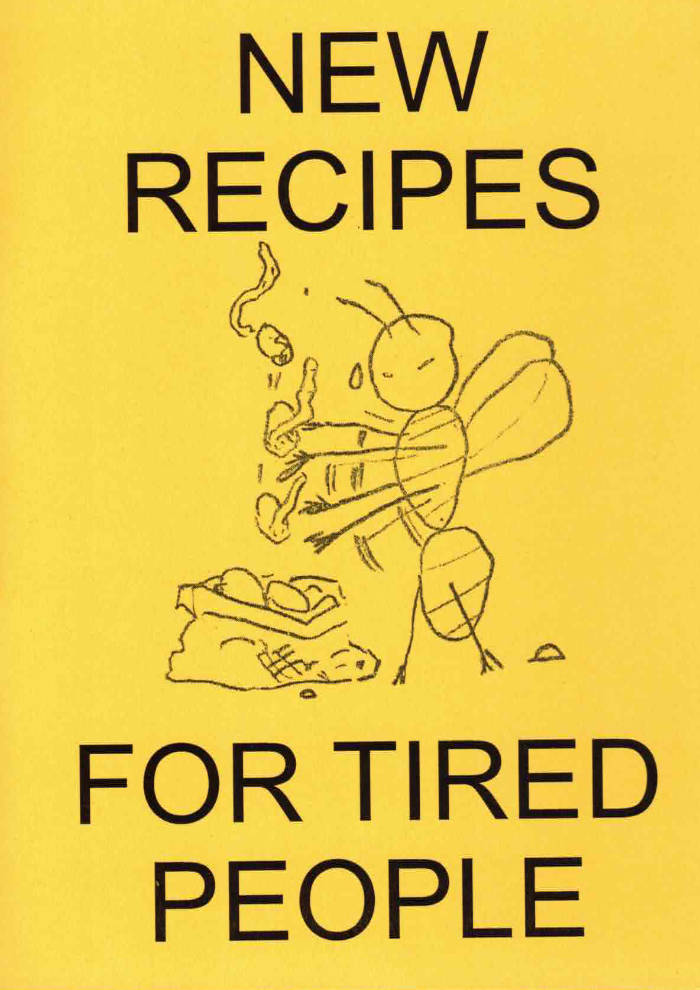
New Recipes For Tired People
Monika Janulevičiūtė, Noah Brehmer
“New Recipes For Tired People” is the first volume of a cookbook series, organized by Monika Janulevičiūtė and Noah Brehmer. This booklet contains 10 tried and tested meal and snack ideas that are easy to shop for, unpretentious to prepare, and simple to customize for people tired and bored of their go-to comfort food. The first edition was produced as a quick print experiment during Publication Studio Vilnius Workshop.
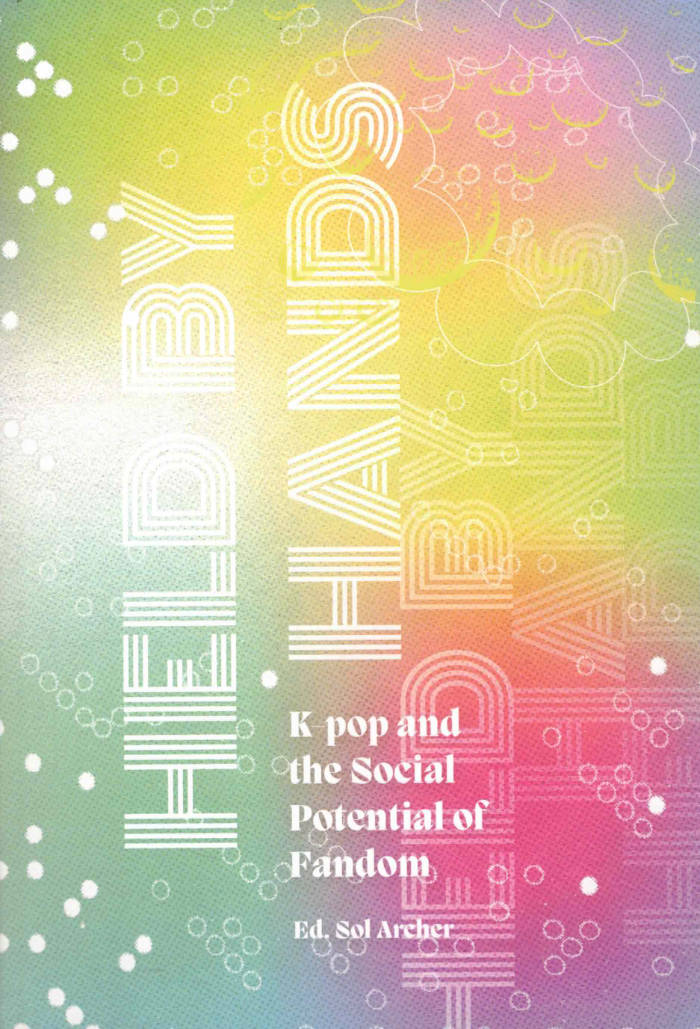
Held by Hands: K-pop and the Social Potencial of Fandom
This book brings together personal and theoretical reflections written by members of the Brazilian K-pop community on the constructive potential of fandom in contemporary society. The texts spans experiences of occupying public space through collective dance practice, identity formation and community support, cultural appropriation in K-pop, the e ects of soft power, and considerations of the phenomenon of fandom
In the fandom universe passive consumption of culture is replaced by active participation in its co-creation. Fan-fiction is one among many examples of this. Autonomous territories, with con gurations and laws unto themselves, are built by fans experiencing culture in collectivised ways. The sense of belonging and formation of identities enabled by exchanges and diverse practices make the K-pop fandom a space with the potential for radical social transformation and collective agency, resisting contradictions inherent to contemporary social norms. This book is a collective body dancing utopia.
With contributions by Aline Barbosa, EVE, Julia Guerreiro, Kananda Simonetti, Kelly Nobre, Lohaynne Beringui, Lucas Victor Aureliano, Marcelle Belfort, Millah C. S. Gomes, Natália Amorim, Paula Castro, Paulina Yeal Cho e/and Sabrina Diniz.
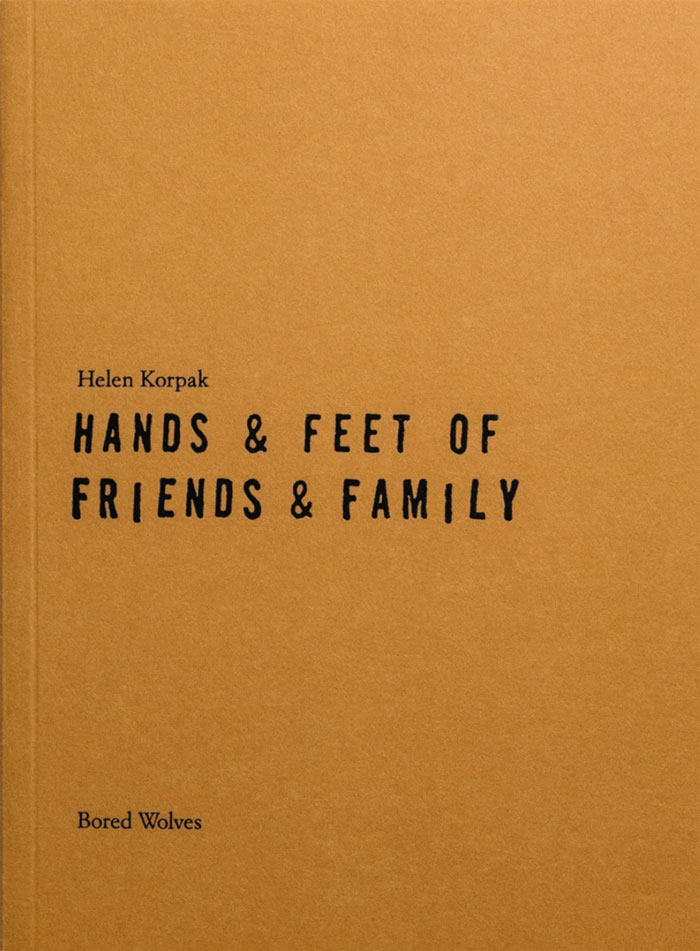
Hands & Feet of Friends & Family
Hands & Feet of Friends & Family is a weave of Helen Korpak’s photocollages and locket-sized literary captions recording closely observed familiar and familial gestures. Granular renderings tenderly taped, Korpak’s collages meld the touching and the wryly humorous, balancing throughout the vulnerability of artist and subjects bonded by essential fondness.
Beginning to look
I started to notice
the older I get
the more I notice
studying the reproductions
separating this from that
noticing the gestures
feeling the movements
of the joints—
Designed and typeset with haptic craft by Samuli Saarinen.
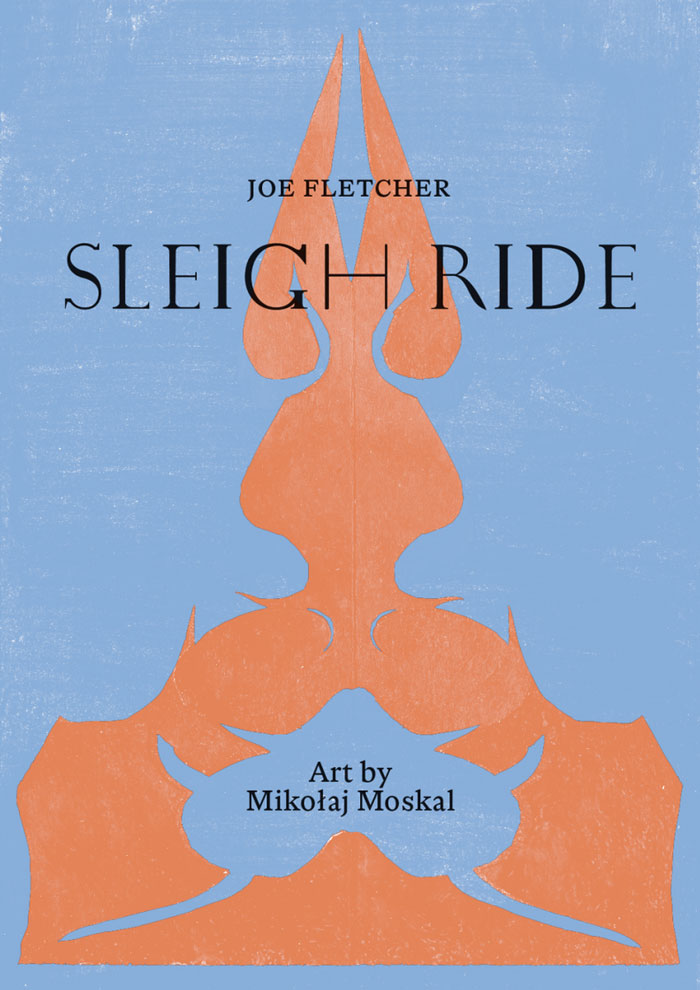
Sleigh Ride
In Sleigh Ride, a kinetically wondrous prose tale from poet Joe Fletcher, a father and his convalescing son plunge in carpentered, stallion-drawn sleigh slashing through lush forest, advancing through a sequence of diorama-like settings. The books ten chapters are interspersed with gouache collages by Kraków artist Mikołaj Moskal (REMMUS), rooted and riverine, functioning as curtains swept aside to reveal each chapter of Fletcher’s exhilarating nocturne.
There was a sleigh: jet black and gleaming.
The long steel runners curved at their termini like arabesques of ice. It was too dark to clearly discern the design on its side, but it was intricate, ornate, suggestive of cuneiform and the minarets of Cairo. Two orange lanterns mounted above the driver’s chair were each encircled by a cloud of gnats and moths. Draped in fabulously embroidered saddlecloths, Ajax and Hector stomped the earth.
Given that the only exit from the cellar was the door, hardly wider and taller than a man, I marveled at how father could have extracted his creation from his smithy and pointed it at the forest. But I said nothing as I climbed unaided onto the purple velvet couch.
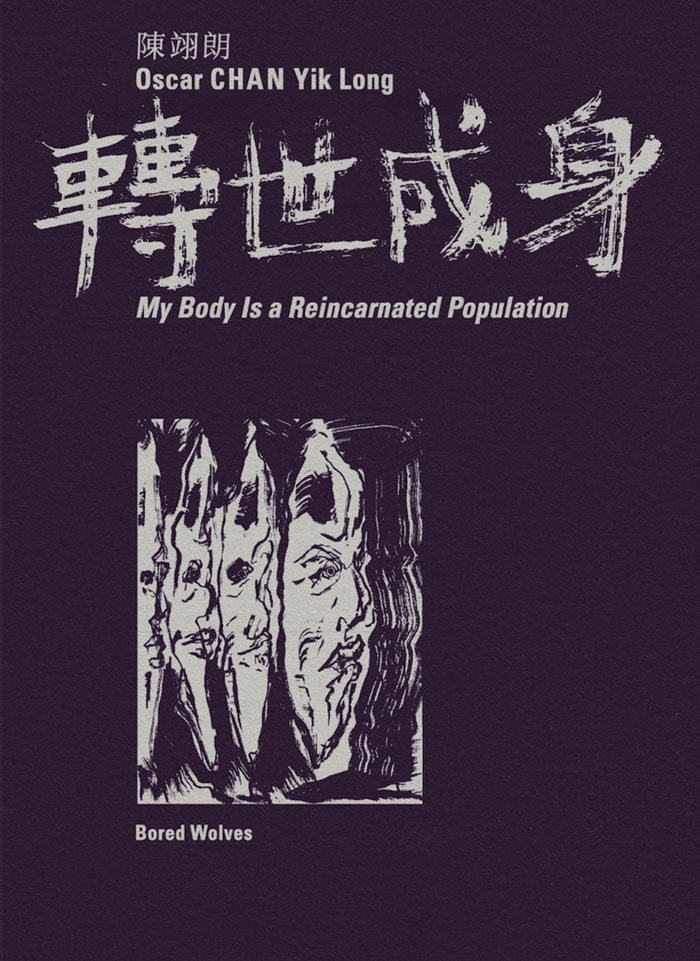
My Body Is a Reincarnated Population
Heart. Compass, radar detector. Lost and anxious. Parents divorce. Respect the rhythm. Fallen angels, now my stomach is all butterflies.
In his artist’s book My Body Is a Reincarnated Population, Helsinki-based Hong Kong artist Oscar CHAN Yik Long (Melted Stars) embraces the pantheon of reincarnated souls embedded within him through ink-and-wash paintings and distilled capsule texts.
His process was guided by the rolls of a die used to connect individuals he has known and encountered in past lives—parents and siblings, relatives and ancestors, friends and enemies, lovers—to his present-life body. Who formed his throat? Who grew into his tongue? Who paired as lungs? Who became skin, muscle, bone, or blood?
The artist’s efforts were ultimately about a form of spiritual atonement in pursuit of physiological harmony for a body facing numerous afflictions: “Through my artwork, I wanted to let the people within me know that, regardless of the tragedies or conflicts that divided us in the past, I have come to terms with everything that happened between us. I sincerely apologize, I express gratitude, I forgive and send love.”
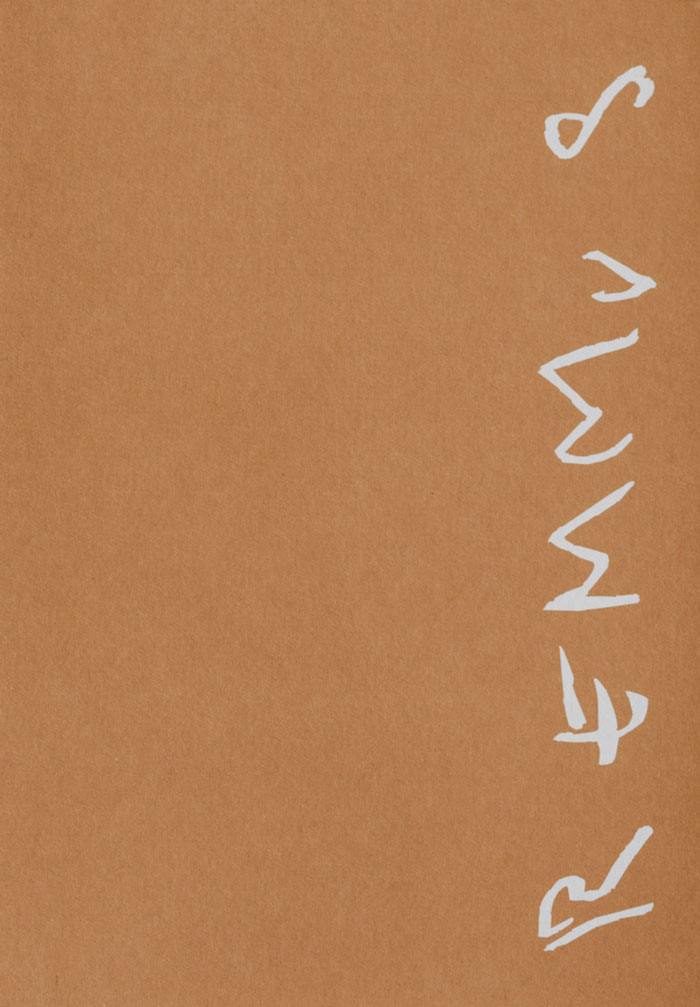
REMMUS
When living things bloom & molder all in a heartskip, when they expand toward death, this is what worms hear.
Artist’s book of paintings by Mikołaj Moskal: gouache, archival paper elements, simple & meaningful captions. REMMUS is a graft of Podlasie earth-water-sky and Mikołaj’s pigments, heart, and intuition. Designed in close collaboration with graphic artist and designer Kaja Gliwa.
The paintings are bracketed by a poem each by Kuba Niklasiński (“Flows | Flaws”) and Stefan Lorenzutti (“What Worm Heard”), handwritten by Mikołaj in English and Polish.
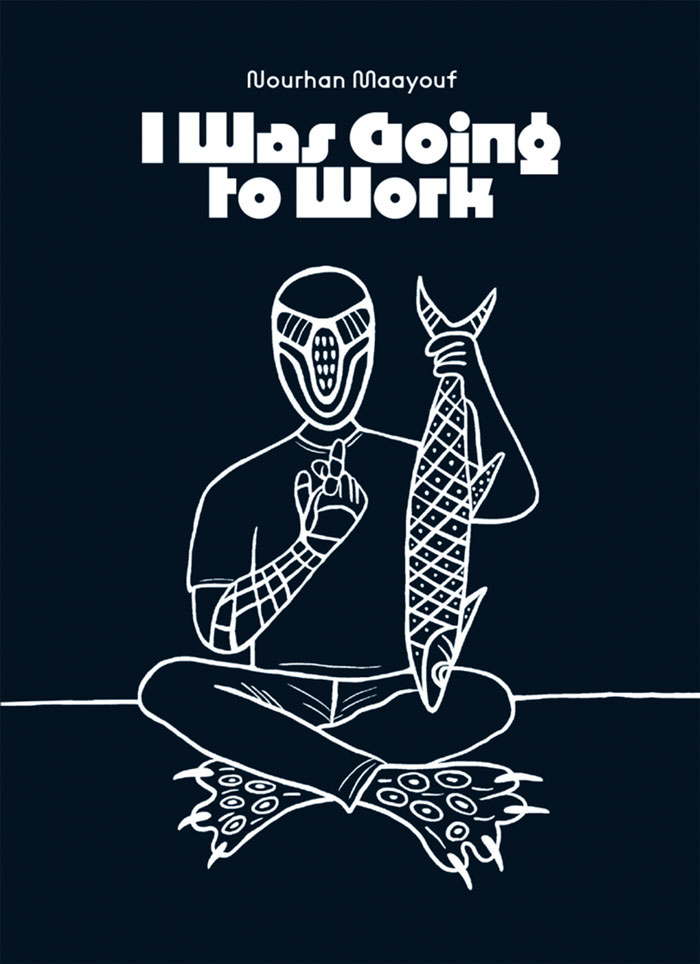
I Was Going to Work
“Invest in a floating city or gentrify a submerged one.”
Nourhan Maayouf’s I Was Going to Work is a hybrid sci-fi picture book by the Cairo-based artist, in which the proto-cyborg citizens of Happy Land Nation establish new-fashioned diurnal rhythms against the ever-present backdrop of a monorail to nowhere and its pillars, idle and idolatrous.
Across forty-four spreads of what might be thought of as a picture book for adults, Maayouf delves into every aspect of a deeply familiar society in which retrograde devolution is billboarded as reinvention by Orwellian technocrats and speculators.
And yet pockets of the cyborg population continue striving, dreaming, craving, protesting, gleaning, and inventing. For a situation to be bleak, some notion of beauty must remain tenaciously rooted where it matters most.
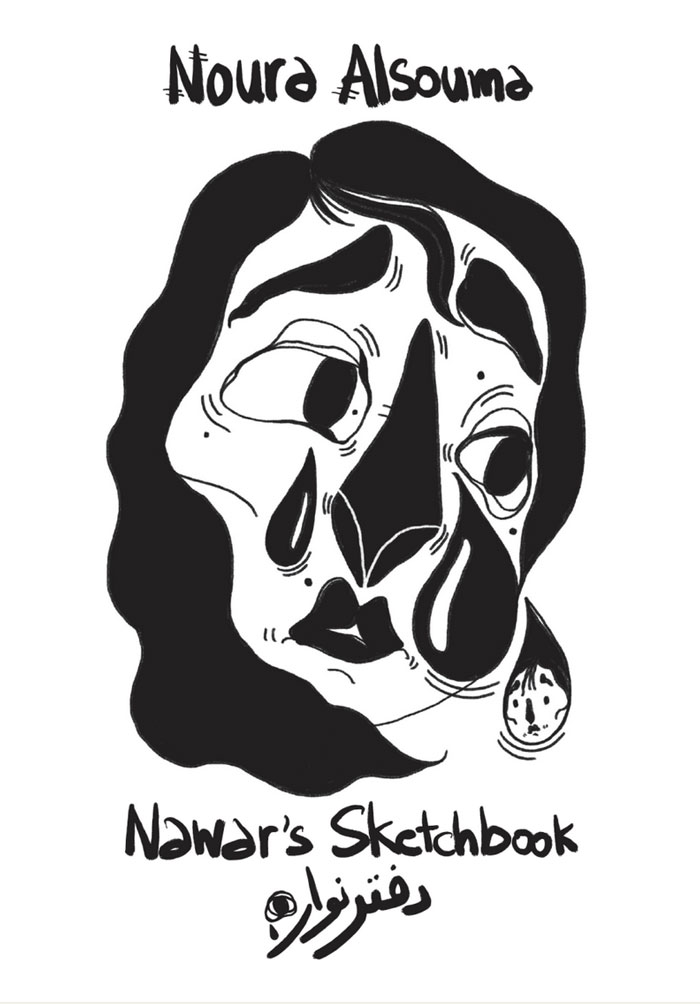
Nawar's Sketchbook
I am not deep, although my eyes are, like a black sea that has been forgotten, as many have told me.
Noura Alsouma’s zine “Nawar’s Sketchbook” is a liquid lament by the Berlin-based Syrian visual artist and printmaker, riveted to eyes that see and therefore shed tears, channeling the heartfelt exposure of the sketchbooks Noura fills to the bleed.
With a moving text by the artist in the original Arabic, reproduced in her handwriting, as well as in English translation by Suja Sawafta.

Multiplication of Organs (Manifesto) – Body, Technology, Identity, Desire
A queering of psychoanalysis put together by the forerunner of Inactual Magazine.
Organ Multiplication Manifesto is an essay that delves into the transformations of sociality and sexuality in the context of digital technologies. Using an interdisciplinary approach that blends philosophy, erotic literature, media theory, psychoanalysis, gender studies, and neuroscience, the text explores how devices, platforms, and technologies shape and produce normative systems that influence our perceptions, desires, and relationships with others. By examining the interplay between desire and digital mediation and drawing comparisons with authors such as Deleuze, Ballard, Žižek, Butler, Preciado, Bataille, and others, this book aims to present a new theoretical, critical, and philosophical perspective in the contemporary discourse on the relationship between humans, technology, and society.
This book begins with an analysis of three iconic erotic texts from Masoch, Ballard and Bataille, and uses this analysis as the departure point for its main theoretical work on the four topics listed in the subtitle. The book passes through a lot of interesting phases, including an analysis of Phenomenology and Gucci, class struggle and OnlyFans and much more, until eventually arriving at the actual manifesto for Organ Multiplication and the beautifully named notion of the "Caged Sun".
Foreword by Vincenzo Estremo.
Afterword by Franco "Bifo" Berardi.
"One may think that the history of the human culture is going to be enormously impoverished by the disappearance of the body, one may think that, on the contrary, human culture has been enriched by the renounce to presence and physical contact. It is not the intention of Damato to save this dilemma, His intention is rather to open a new field of investigation, and possibly to start a reflection on a more advanced dilemma: will the change of perception make possible the emergence of a new ontology, or is the disappearance of the body going to mark the final dissolution of human life itself?" — Franco "Bifo" Berardi
Christian Nirvana Damato is a writer, curator, and independent researcher working in the fields of philosophy, technology, psychoanalysis, and visual culture. He teaches media theory at the IED in Turin and runs various workshops on publishing and writing. He writes for and collaborates with various magazines and publishing houses. He is the founder and editorial director of Inactual. He has also published Medial Disorders. Interpretive and Non-statistical Compendium of Technological Disorders. Vol I, with contributions by Geert Lovink, Alfie Bown, Isabel Millar, Eyal Weizman (Forensic Architecture) et al. (ed. by, Inactual, 2024), Wearable Statistical Desires. Re-programming the performativity of the body through digisexuality (Mimesis 2025; Everyday Analysis, 2025) and Medial Disorders Vol II.
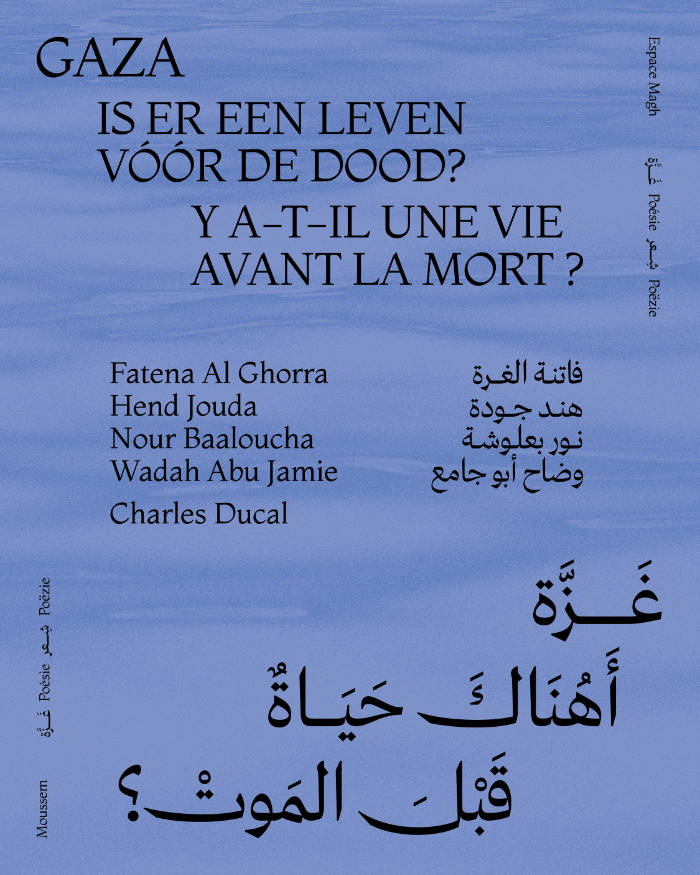
GAZA, Is er een leven vóór de dood?
In the face of utter devastation, Palestinian poets offer their words as mournful testimonies of grief and war, but also of unwavering hope and resistance despite all. In collaboration with Espace Magh, we are proud to present “GAZA, Is there life before death?”: an trilingual anthology of poems written by Fatena Al Ghorra, Hend Jouda, Nour Baaloucha and Wadah Abu Jamie, as well as Charles Ducal.
Edited by Mohamed Ikoubaân and Taha Adnan, the book consists of three parts: the Arabic poems, their French rendering, and newly translated Dutch versions. Across these languages, poetry figures as a bulwark against the degradation of humanity. The book forms a tribute to those who continue to carry out the voice of their people in spite of their occupation and annihilation.
Poëzie is een daad van verzet op een plek waar de hoop lijkt te zijn weggevaagd. Het is een blijvend bastion tegen menselijke degradatie. De Palestijnse dichters Hend Jouda, Fatena Al Ghorra, Nour Baaloucha en Wadah Abu Jami getuigen in hun poëzie over de oorlog op Gaza en de veerkracht van hun volk. Samen met Charles Ducal maken ze deel uit van GAZA, Is er een leven vóór de dood? Deze drietalige bloemlezing, samengesteld door Taha Adnan en Mohamed Ikoubaân, brengt hun gedichten in het Arabisch samen met vertaalde versies in het Nederlands en in het Frans.
En collaboration avec Espace Magh, Moussem présente une anthologie trilingue de poèmes écrits par les poèt·ess·es palestinien·ne·s Hend Jouda, Fatena Al Ghorra, Nour Baaloucha et Wadah Abu Jami, accompagné·e·s de Charles Ducal. Dans GAZA, Y a-t-il une vie avant la mort ?, iels témoignent de la guerre à Gaza et de la résilience du peuple palestinien : des poèmes devenus acte de résistance là où tout espoir semble avoir été écrasé.
De dichtbundel is gepubliceerd ter gelegenheid van het gelijknamige programma dat op 24 juni 2025 plaatsvond in Espace Magh: een avond waar poëzie werd voorgedragen als hulde, als echo van waardigheid en solidariteit. Zoals Taha Adnan aangeeft in het voorwoord: wij hebben niet de rol van spreekbuis willen spelen. Hier is het woord aan Gaza.
De gedichten in het Arabisch (Palestina) en het Frans van Fatena Al Ghorra, Nour Baaloucha en Hend Jouda zijn afkomstig uit het gelijknamige boek, Anthologie de la poésie Gazaoui d'Aujourd'hui, vertaald door Abdellatif Laâbi en samengesteld door Yassin Adnan (Éditions Points, 2025). De Nederlandse vertalingen uit het Arabisch zijn tot stand gekomen in samenwerking met de Onderzoeksgroep Arabistiek en Islamkunde van de KU Leuven.
Doorheen deze drie talen brengt het boek een eerbetoon aan zij die de stem van hun volk blijven uitdragen, ondanks hun bezetting en annihilatie.
Teksten:
Fatena Al Ghorra
Hend Jouda
Nour Baaloucha
Wadah Abu Jamie
Charles Ducal
Taha Adnan
Vertalingen:
Abdellatif Laâbi
Taha Adnan
Jean-Marie Gerard
Danielle Losman et le Collectif des Traducteurs de Passa Porta
Nisrine Mbarki
Heleen Mercelis
Roumaisa Boulbahaim
Hanna Jacobs
Dilara Karataş
Freya Moonen en Jade Gevers
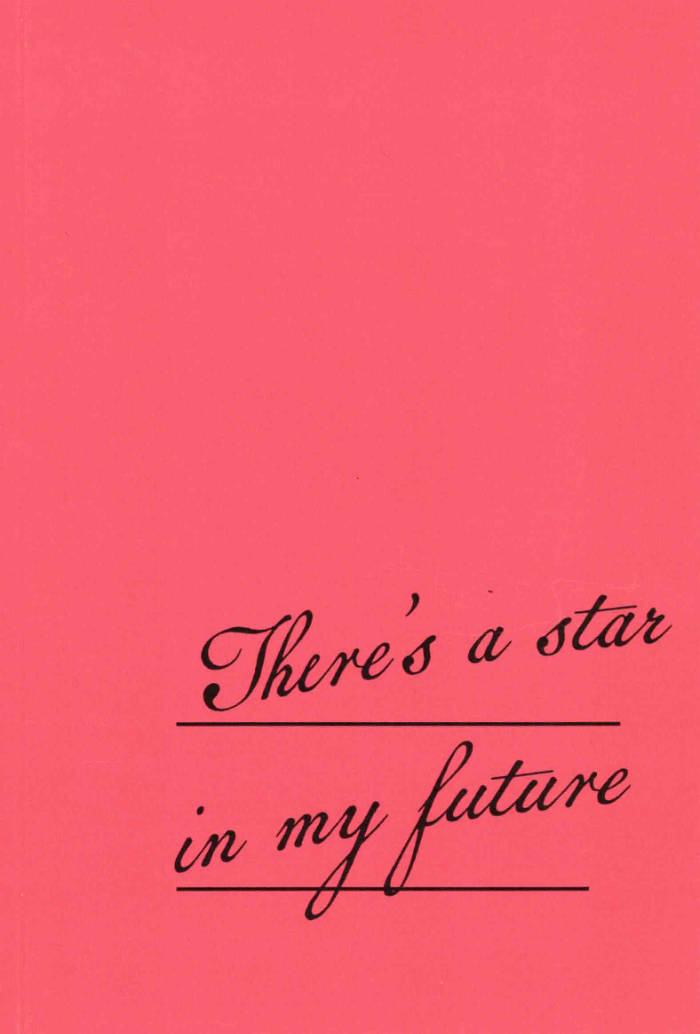
There's a star in my future
There’s a star in my future, catalog of the eponymous exhibition, curated by Mélodie Sylvestre & Zélie Péguillan
With contributions by Alice Payan, Amal Guichard, Ariane Kiks, Astrid Vandercamere, Dominique de Groen, Indigo Deijmann, Irma Vape, Léa Mainguy, Mélodie Sylvestre, Molly Soda, Pauline Baudoux, Zélie Péguillan
Graphic design : Poline Maréchal
100 copies, 200 x 137 mm

Why I Failed in Porn
This book follows my journey of launching, growing, and ultimately failing in the adult entertainment industry. It explores society’s complex relationship with porn and sex education, the challenges of entrepreneurship, and the struggles of working in a deeply stigmatized space. Sometimes funny, often dramatic, and always surprising, it offers an unfiltered look at the business side of porn and what it really takes to challenge the status quo.
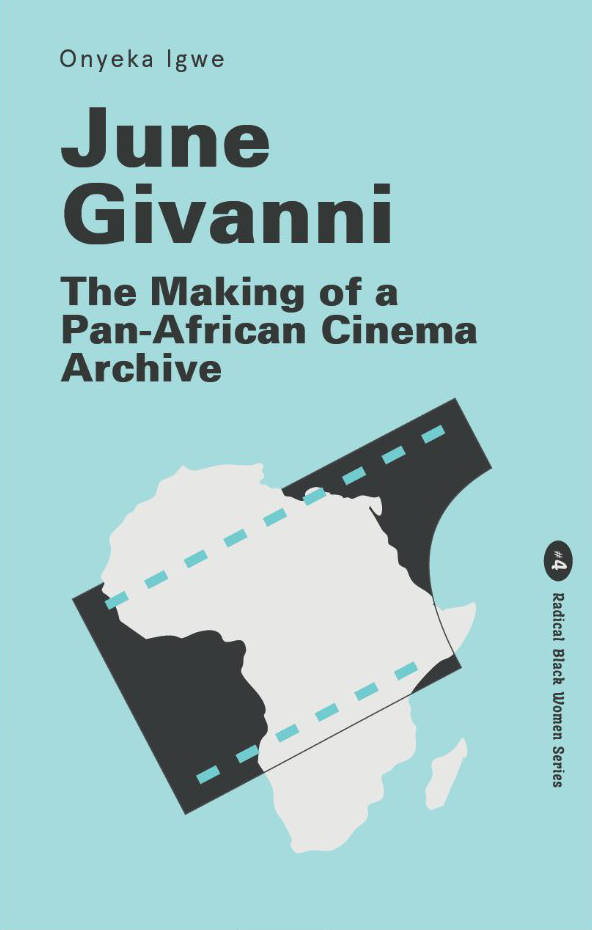
June Givanni: The Making of a Pan-African Cinema Archive
A journey through the archive of BAFTA award-winning curator and film programmer, June Givanni. This private collection made public contains thousands of films from across Africa, the Caribbean and the diaspora amassed in a career spanning more than forty years. Using oral history interviews and ephemera from four film festivals as her touchstones, author Onyeka Igwe offers a way to encounter Pan-African film through the archive.
The book starts with Third Eye, the film festival that propelled June into a career in Pan-African cinema. Through connections she made there, she travelled to FESPACO in 1985. Participating in the festival while Ouagadougou, Burkina Faso was under the leadership of revolutionary Thomas Sankara was a formative experience. In Ouagadougou she connected with film programmers Suzy Landau and Claire Andrade Watkins, who would take steps to organise Images Caraïbes, Fort de France, Martinique, 1988, and Celebration of Black Cinema, Boston, US.
Using original oral history research with June and other key figures in Pan-African and Black British cinema, Onyeka uncovers the important role that women festival organisers, programmers and cultural workers have played in Pan-African cinema history. She conceptualises June Givanni’s Pan-African Cinema Archive (JGPACA) as a feminist counter archive that foregrounds marginalised histories and proposes a radical approach to archiving itself. In tracing and naming the cinematic legacies that ground political filmmaking practices today, she preserves June’s work, knowledge and fervour for Pan African cinema for future generations.
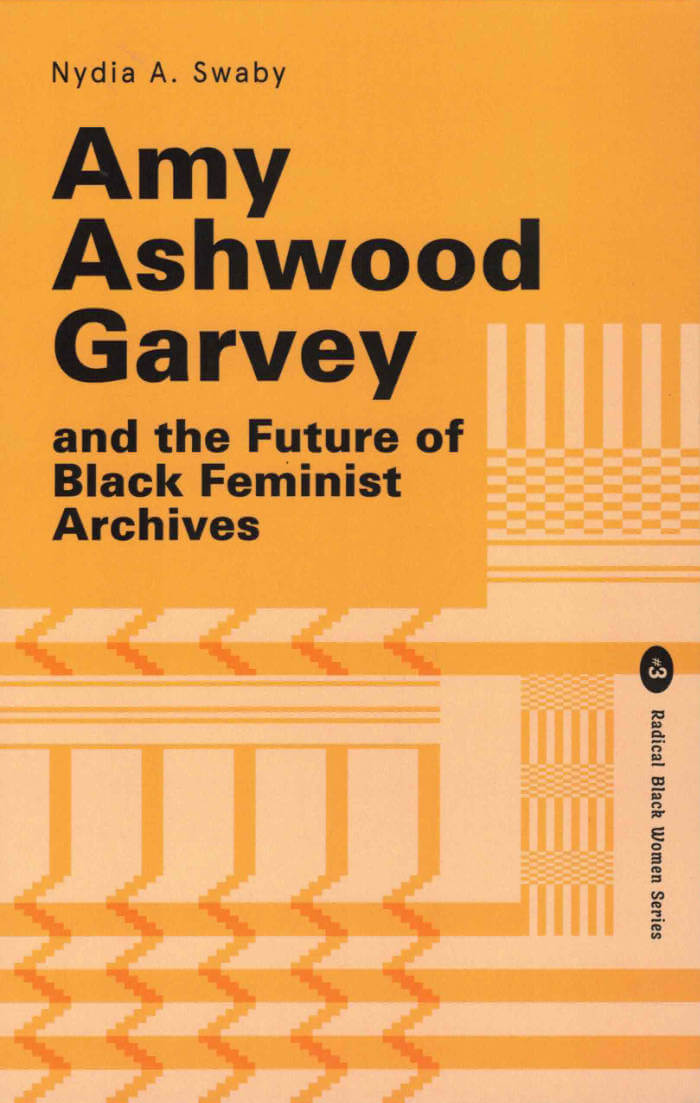
Amy Ashwood Garvey and the Future of Black Feminist Archives
This book charts the journey of Black feminist, artist, researcher and curator Nydia A Swaby as she pieces together a biography of Pan-Africanist and feminist Amy Ashwood Garvey from her scattered archive. In turn, it offers a reflection on the future of Black feminist archival practice.
Often referred to as the first wife of Marcus Garvey, Amy Ashwood Garvey’s contributions to movements for social justice, and in particular Black women’s rights, have largely been forgotten, not least since archives about her life and work are spread across the various places she lived.
After helping Marcus Garvey set up the UNIA, one of the most influential Pan-African movements in the world, Amy moved to New York, where she thrived in the Harlem Renaissance. In the 1930s she emigrated to Britain, where she set up a boarding house and social centre called the Afro People’s Centre, and a club called the Florence Mills Social Parlour. Swaby recovers Amy’s life and work as an important political activist, cultural producer and Pan-Africanist in her own right, retracing her steps across the Caribbean, US, Britain and West Africa.
In addition to conducting traditional archival research, Swaby creates a series of ‘curatorial fabulations’, imagining into the gaps in the archive with her autoethnographic practice. Drawing on the work of contemporary Black feminist researchers, archivists, curators and artists, and her own creative practice, Swaby animates the process of creating and curating Ashwood Garvey’s archive. In doing so, she reflects on the practice of Black feminist archiving past, present and future.
This is the third book in LW’s Radical Black Women Series. It will be essential reading for scholars and students of Black feminism, Pan-Africanism, Black British history, Black arts and archival practice. Endorsements forthcoming from leading scholars in the field including Carole Boyce Davies, Ego Ahaiwe Sowinski, Kelly Foster, Kesewa John and Lola Olufemi.
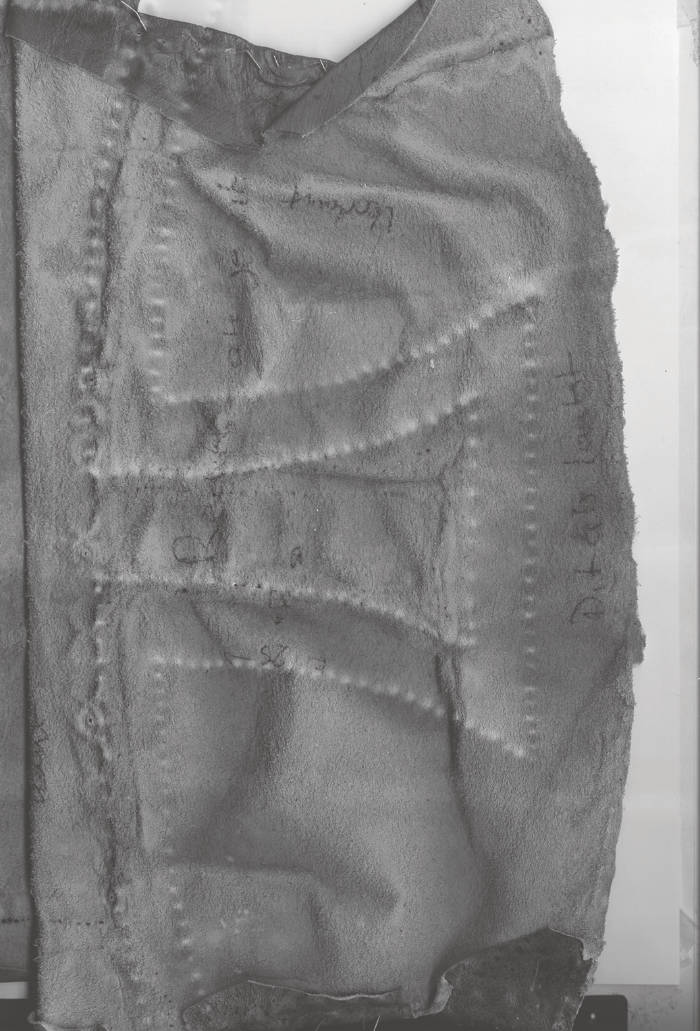
Teenage Lightning: Cinematic Apparatus On Humanly Perception
The book explores how we experience perceptual dissociation and deep immersion when engaging with screen media. Drawing from perspectives such as media criticism, psychological states, and the evolution of visual technology in cinema, it examines how our senses respond to screens. A central theme is the reconsideration of animism—the belief that objects or images possess life—as a fundamental, primitive form of cinema. The work also reflects on the relationship between light and the screen, integrating my own artistic practice in film, light, and interactive media.
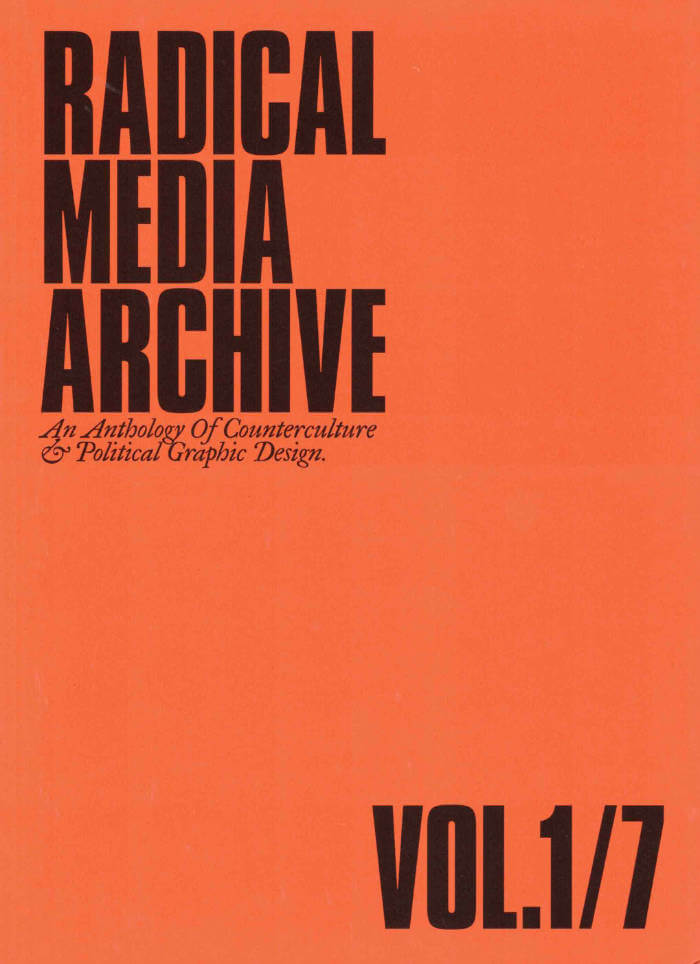
Radical Media Archive Vol 01
Ramdane Touhami, Émile Shahidi
Do you remember the last time you were looking forward to the future? We're not talking about flying cars or floating screens. We're talking about a credible vision of a better time to come. So when was the last time? How did it look? How did it feel?
Have a glance at page 223, about two-thirds in. This is a portrait of Frantz Fanon by Milton Glaser. One of the biggest names in commercial graphic design of the 20th century, painting the likeness of the giant of anti-colonial thought. Let’s leave aside the question of "who's the Milton Glaser of today?" for now, but if there was one, whose portrait would they be painting?
What we’re attempting, in these few hundred pages, is to track our favorite examples of the visual language of revolt and solidarity in the 1960s and 1970s, put them in dialogue with our most beloved works of graphic design of those decades, and celebrate the heroes who made them.
Creative currents flowing from Paris to Tokyo, Cuba to Milano, Beirut to New York, Berkeley to London, with innovations and revolutions (both political and artistic) happening every year. Causes supported by incredible talent and inspiring design that activated people, uplifted liberation movements, advanced the struggles for social justice, and created bonds of global solidarity.
Sadly this cross-pollination between commercial art and the political ended around the late 1980s and those two worlds are now completely isolated from one another.
Why do movements not produce beautiful and memorable visuals anymore? Why do the biggest image makers of today not lend their talents to the good fights that need their help? We hope that these will intersect again, and the first step is to study their history.Friends, we are here to tell you that fighting for a better world is, in fact, not only extremely cool, but the coolest thing you can do — and we have the images to prove it!
Ramdane Touhami and Émile Shahidi have spent years researching and traveling to assemble a huge collection of books, rare periodicals and radical art that will soon be available for consultation in person and online, and of which this little book is just a taste.
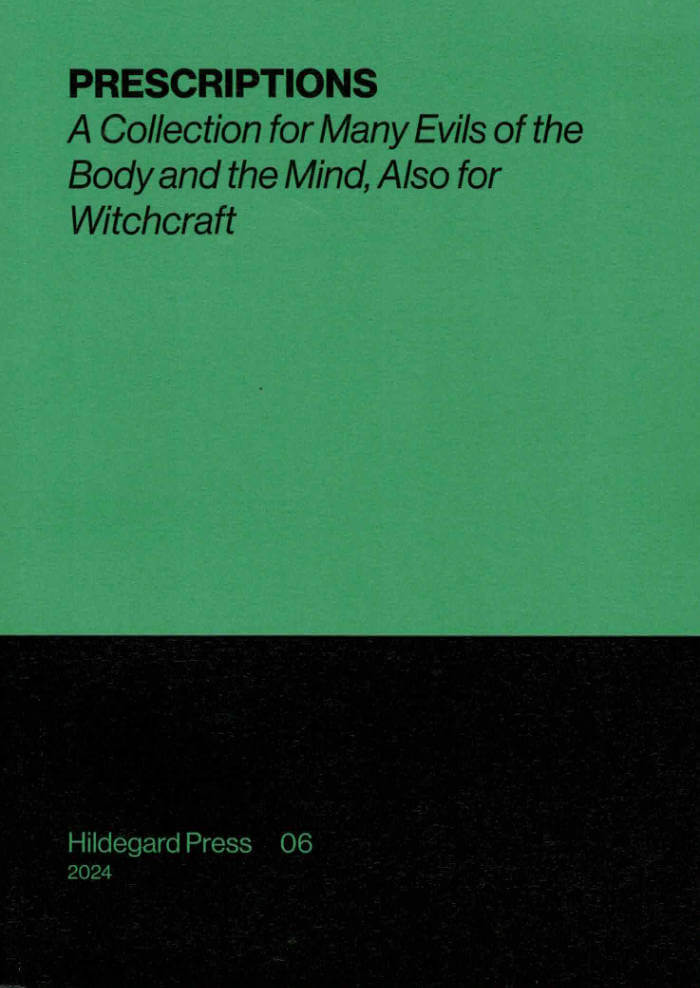
PRESCRIPTIONS: A Collection for Many Evils of the Body and the Mind, Also for Witchcraft
PRESCRIPTIONS is a transcription of a handwritten manuscript, dated to approximately 1650, containing a wide range of medicinal and magical remedies. Currently housed in the Cornell University Witchcraft Collection, it is assumed this practical handbook was a reference for healing, midwifery, and other medical/magical advice. Recipes and instruction cover various methods of purging, ointments for swellings, fevers, and pain reduction, lotions for venereal disease, advice for childbirth, and dilemmas such as “worms in the ear.” Accompanying these medicinal prescriptions are a series of magical prescriptions: charms, rituals, and spells recorded to fortify the ailing body, induce amorous desire, or seek revenge.
With its mix of Latin words, Early Modern English parlance, colloquial plant names, apothecary weights, and archaic medical terms, the recipes can at first appear opaque, but with sustained engagement one can begin to decipher the logics and structures within the writer(s)' shorthand. The original manuscript, in having its own detailed glossary, index, and citations, exhibits a meticulous cataloging of knowledge and resources, and reveals an earnest desire to hold onto the integrity and sanctity of the body in the face of 'many evils.'
The transcription is accompanied by a glossary of terms, an explanation of the various apothecary measurements used, and expanded citations of the medicinal/magical treatises that were abbreviated within the original text.
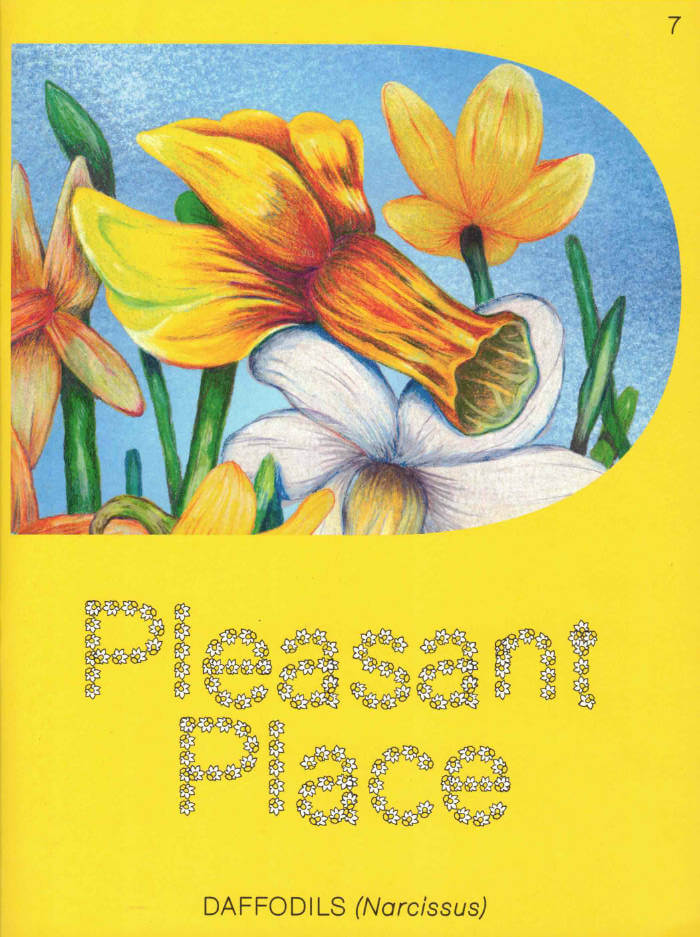
Issue 7: Daffodils
Many bulbous plants have been dubbed ‘heralds of spring’, but none is more deserving of the title than those carrying actual megaphones to spread the word – daffodils. To know a daffodil is to love a daffodil. Come join our cult.
Including:
I Like the Daffodils – An introduction by Lou-Lou van Staaveren to the genus Narcissus, with amazing photographs by Elspeth Diederix from her garden.
Dafs in Art History – Painters, poets and writers all over the world, have been inspired by the daffodils’ dual aura of macabre and threatening elegance.
The Daffodil Society – The members of The Daffodil Society in the UK promote the genus Narcissus for everyone’s greater pleasure. Photographer Luke Stephenson followed them to various shows where their flowers are reviewed.
How to follow your nose – Philosopher Christopher F. Julien invites us into his fragrant garden where scent mixes with memories with drawings by Pom Koolen.
Artist Tina Farifteh digs into her personal archive and writes a beautiful account of her memories growing up in Iran, and how daffodils have become a staple for New Year’s celebrations and a symbol of hope.
Cover and inside cover by Lou Buche
Centrefold miniatures by Jesse Fischer
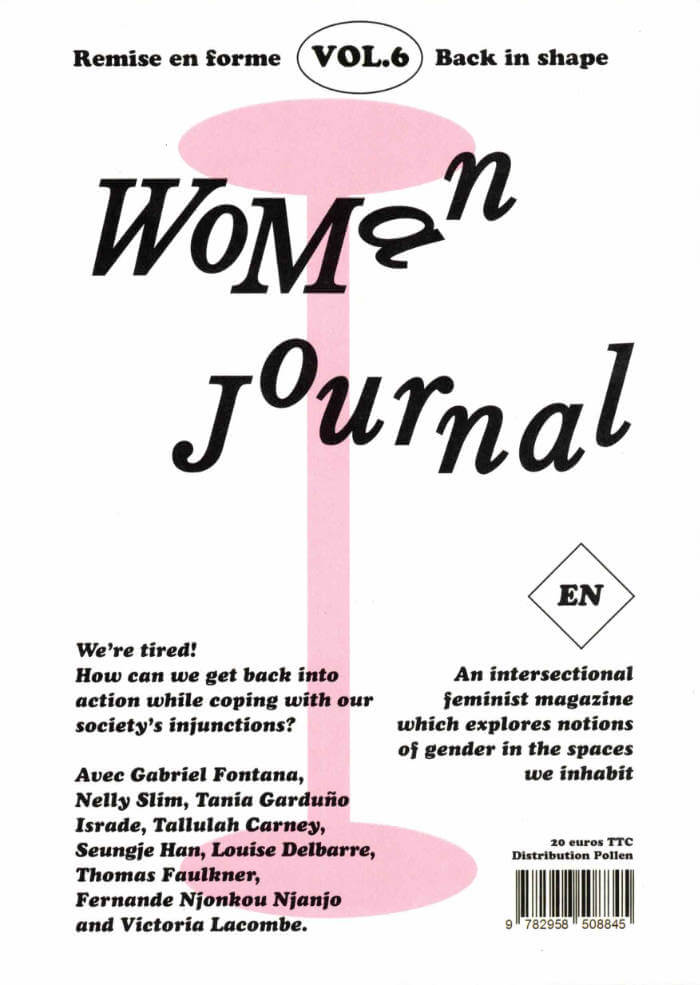
Woman Journal Vol. 6: Back in Shape
Do we always have to be nice, kind and communicate respectfully? Wouldn't it sometimes be better to change our tone, to use force or even violence? We often want to act in a spirit of “care” and benevolence, but how do we know if we're really being altruistic and sympathetic? Vol.5 asks the question: Nice?
With contributions from :
Muf architecture/art, Mélanie Mazet, Bui Quy Son, Paul-Antoine Lucas, Armelle Breuil, Annabelle Vaillant, Napsugár Trömböczky, Alessandro Di Egidio,
Elsa Muller, Clara Lenoir, Léo Jacqmin, Clem Koren, Pola Noury, Grève cœur and Cassiane C. Pfund
This publication is edited by the Woman Cave collective founded by Leticia Chanliau and Chloé Macary-Carney.
318 black & white pages, brown cover
Micro edition of 700, printed in Aubervilliers by Isiprint.
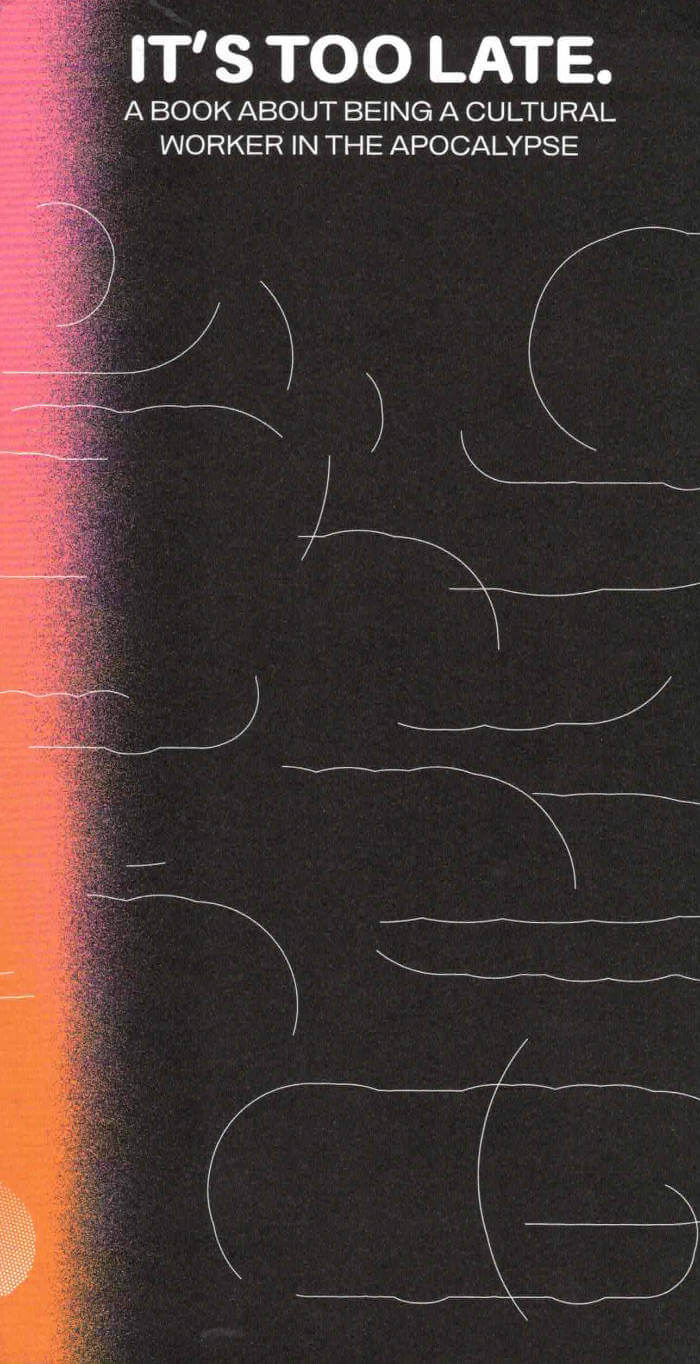
It's Too Late. Do It Anyway!
Cassie Thornton, Magdalena Jadwiga Härtelova
Hey culture worker! Are you feeling alone and afraid while the world burns? It’s Too Late. Do It Anyway! is two books in one, created for cultural workers who want to get off the racial capitalist high-speed-train-to-nowhere and start structuring revolution through collective care.
It’s Too Late. Do It Anyway! offers two routes into a fractal support network designed to shed absurd, useless forms of artworld prestige in favor of collectively producing a world organized to support caregivers. It’s Too Late tells the true story of an exhibition about care that exposed the difference between making symbolic gestures and actually doing something. Do It Anyway! serves as a manual for The Hologram, a prism-shaped collective care protocol conceptualized by artist Cassie Thornton, inspired by the Social Solidarity Clinic of Thessaloniki in Greece, and now practiced by people all over the world.
In It’s Too Late. Do It Anyway! multiple voices weave The Hologram into the present, the past, and the future all at once, ultimately putting the story and the tools it describes into each reader’s life-wizened hands. This is not really a book; it’s a pathway out of the tough spot we are all in right now. Anyone can make use of it, even you.
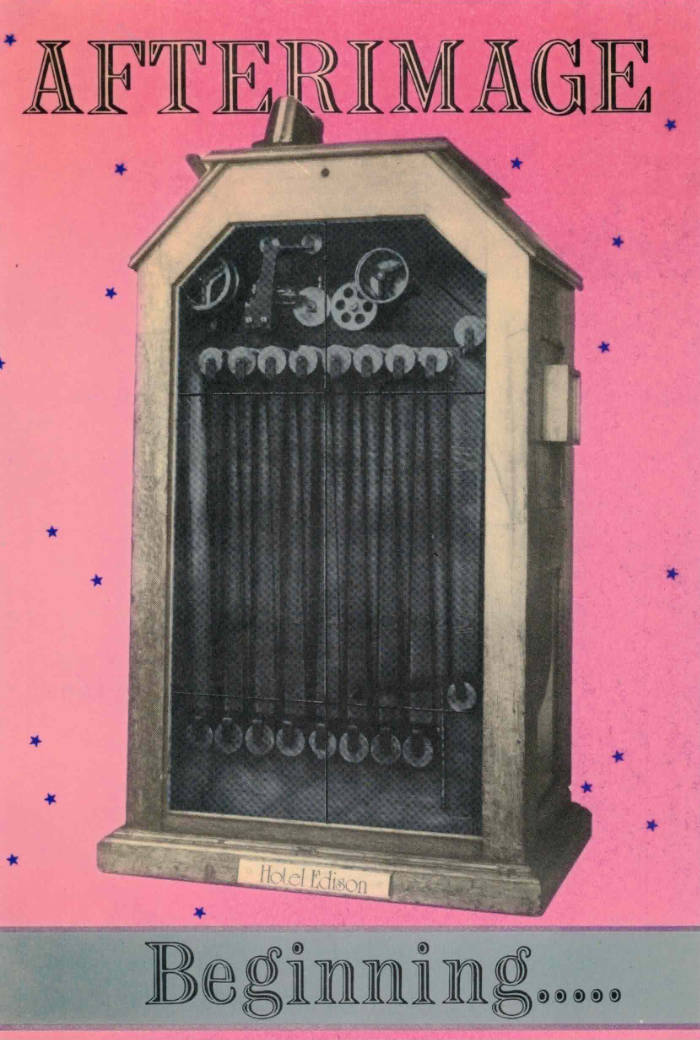
Afterimage Nos. 8/9, Beginning … and Beginning Again
The independent British film journal Afterimage published thirteen issues between 1970 and 1987. International in scope, it surveyed the many forms of radical cinema during an extraordinary period of film history. Having emerged in the wake of post-1968 cultural and political change, Afterimage charted contemporary developments with special issues on themes such as the avant-garde, Latin American cinema and visionary animation, and also looked back at early film pioneers. It published many of the leading critics of the period and vitally provided a forum for filmmakers’ writings and manifestos.
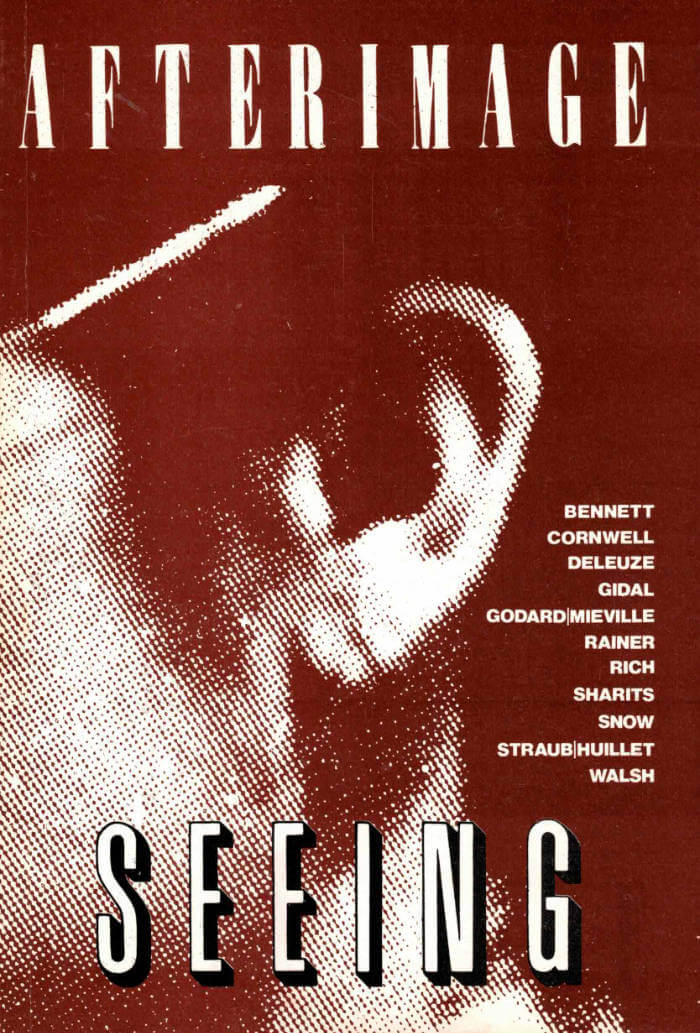
Afterimage No. 7, Seeing: Hearing
The independent British film journal Afterimage published thirteen issues between 1970 and 1987. International in scope, it surveyed the many forms of radical cinema during an extraordinary period of film history. Having emerged in the wake of post-1968 cultural and political change, Afterimage charted contemporary developments with special issues on themes such as the avant-garde, Latin American cinema and visionary animation, and also looked back at early film pioneers. It published many of the leading critics of the period and vitally provided a forum for filmmakers’ writings and manifestos.